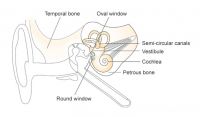Inner ear section
Image
Labeled graphic:
Section view with the most important parts of the inner ear. The most important parts are highlighted in color.
Available in:
English, German
Type of media:
Image (46.6 kByte)
Last update:
2018-04-22
License:

This medium is made available under a CC BY-SA 4.0 international license.
What does this mean?
How to reference this medium

This medium is made available under a CC BY-SA 4.0 international license.
What does this mean?
How to reference this medium
Description:
Both the sense of balance and the sense of hearing are situated in the inner ear.
The inner ear is formed by a complicated system of cavities. This system is called the bony labyrinth.
Distinction is made between the cochlea, the semi-circular canals and, in between, the vestibule. In the cochlea there are two openings each covered with a taut membrane. These are named after their shape, i.e. round window and oval window. The oval window is a sort of entrance for sound and the round window a sort of exit.
Information and ideas:
Helps to put the inner ear in the overall context of the structure of the ear.
Can be used, for example in a worksheet, for work together in class with the digital projector, as overhead transparency.
Relevant for teaching:
Structure and function of a sensory organ
Reception of stimuli and transmission of information
Functions of senses
The inner ear is formed by a complicated system of cavities. This system is called the bony labyrinth.
Distinction is made between the cochlea, the semi-circular canals and, in between, the vestibule. In the cochlea there are two openings each covered with a taut membrane. These are named after their shape, i.e. round window and oval window. The oval window is a sort of entrance for sound and the round window a sort of exit.
Information and ideas:
Helps to put the inner ear in the overall context of the structure of the ear.
Can be used, for example in a worksheet, for work together in class with the digital projector, as overhead transparency.
Relevant for teaching:
Structure and function of a sensory organ
Reception of stimuli and transmission of information
Functions of senses
Related media:
Learning resource type:
Illustration
Subjects:
Biology
Grade levels:
Grade 5 to 6; Grade 7 to 9; Grade 10 to 13
School types:
Middle/high school; Vocational training
Keywords:
Anatomy (human); Ear; Ear (inner ear); Medical illustration
Bibliography:
Siemens Stiftung Media Portal
Author:
MediaHouse GmbH
Rights holder:
© Siemens Stiftung 2018



